- Home
- Cheryl Bolen
His Lady Deceived Page 3
His Lady Deceived Read online
Page 3
He did, though, enjoy listening to music when performed by talented musicians. As he listened to Lady Sarah play, he knew his mother, who was prone to exaggerating, had not done so this time. Lady Sarah Milton was exceedingly accomplished at the pianoforte. Her selections were impeccable, too. He could sit for hours and listen to the beautifully haunting melody of her music.
He was mesmerized watching her. In one other matter his mother had not exaggerated. Lady Sarah was a beauty. Now that he was able to observe her full face, he saw that her eyes were large and blue, set in a flawless face that could have been molded by a sculptor of renown. The perfection even extended to her teeth, which presently nipped at her full lower lip.
His gaze skimmed over her full bosom. He was not unaffected. He forced his gaze to her elegant fingers as they whisked over the keys with so rare a skill only a few possessed.
After she had played three songs, he began to envy Potts. Perhaps now that Potts had poisoned her against him, Potts would try to claim the beauty for himself. Alfred could not blame him.
But he could still envy him.
Not that Alfred ever wanted anything to do with well-bred ladies. Or with marriage.
After the fourth song, the duchess strolled to the pianoforte and led the chamber in applauding Lady Sarah’s performance. “I truly hate to bring this to an end,” she said, “but I promised the men we’d set up whist tables.”
Alfred never thought he’d ever see the time when music would trump whist for him. That’s how much he enjoyed Lady Sarah’s play.
To account for the odd number caused by his bringing Potts, the duke begged off, saying he had correspondence he must see to in his library that night. That left exactly three tables of four. He suspected his mother must have transpired with the duchess on the pairing for he found himself partnered with Lady Sarah.
One of the things he hated about playing whist at these country homes was being forced to play with women, whom he considered inferior players. Alfred took his whist extremely seriously. He always played to win.
“Do you account yourself to be a tolerable whist player, Lady Sarah?” he asked that lady when she sat down.
“No, Mr. Wickham.”
He tried not to show his disappointment, but he was especially downcast because they were playing against his sister and her husband. Not only was Dunsford a worthy opponent, but his sister was the best female player he knew. Even though it was to be a friendly game, Alfred never wanted to lose.
“I’m a very good player,” Lady Sarah added.
He exchanged an amused glance with her. “And to what do you attribute that, my lady?”
“Practice. My Papa taught me to play when I was four.”
He glanced at the table where her parents were challenging his parents. It ought to be a good contest. Then he regarded her with a raised brow. “You knew your numbers at that age?”
“My dear sir, my Papa was teaching me about Pythagoras long before that. I could count to a thousand at three.”
“A prodigy, to be sure.”
“We don’t all live to throw away money on the likelihood of another’s improbable matrimony.”
So she’d been informed of the betting books at White’s, and she was making him feel like a complete wastrel.
As Em sat down and drew up to the table, he marveled at her belly. It was so huge. How amazing that a human being could be rolled up inside her! How charmingly devoted was her husband! Dunsford was a good sort. No one could have been a better husband to his sister. In addition to being besotted over her, not once had there ever been any suspicion of infidelity—and that was rare in their circle.
It was the same with his cousin Bonny and the duke who adored her. Alfred’s chest tightened when he thought of his own father’s infidelities. But, then, his mother was not an easy woman with whom to live.
Alfred, of course, loved his mother, as maddening as she was. Often, he’d wondered why his father had married her. They were so unsuited. His mother had brought a hefty dowry, and she was a handsome woman even though she was in her fifties. He’d been told she was uncommonly beautiful when she came out and captured his father’s heart. Papa had offered for her just days after they met. Was that hasty wedding the reason Alfred was so violently opposed to getting married? He certainly wanted no part of a marriage as loveless as his parents’. Though he loved his mother, he would never marry a woman who possessed any of her domineering characteristics.
The Dunsfords took the first hand, but as the game progressed he realized that Lady Sarah had not boasted. Her skill at whist was well above average.
“I must commend your father,” he told her. “He taught you well.”
She glared at him. “Why is it men must always credit men? Is it inconceivable to men like you—men whose only interests are in sporting pursuits—to accept that women are capable of things other than watercolours and embroidery?”
Lady Dunsford clapped her hands. “Well said, Lady Sarah,”
Alfred felt like a lad just sent to the headmaster’s at Eton. “Do forgive me, my lady. I did not mean to imply that I find your gender intellectually inferior.”
“Oh, but I’m sure you do, Mr. Wickham,” Sarah said. “Just as I find sportsmen just a wee bit . . . inferior.”
He couldn’t help it. He glared at the infuriating woman.
Potts’s rubber was completed before theirs, and to Alfred’s irritation, he came to stand behind Lady Sarah’s chair. With each of her moves he nodded approvingly. Alfred’s friend reminded him of the devoted Lord Dunsford standing behind his wife’s chair earlier in the evening.
Good Lord, could Potts be falling for Lady Sarah just because she was possessed of a pretty face? And a perfectly heavenly bosom—from which Alfred had a most difficult time averting his gaze? No matter how abrasive the woman was, he kept thinking about those plump breasts and how he would love to . . . glory in the feel of them, the taste of them, the beauty of their rosy tips. The very notion aroused him.
Why, of all the respectable women in the kingdom had he been forced to spend Christmas with this sharp-tongued, self-assured, opinionated, exceedingly distracting woman who happened to be possessed of beauty—and magnificent breasts?
Chapter 4
As the ladies gathered in the drawing rooms the following morning, Sarah was reminded of an expression favored by her paternal grandfather. She felt like a third tit. Every woman in the room was a wife--and most of them cherished. Since her conversation with Lord Pottinger the previous night she not only felt more than ever like a third tit, she felt humiliated.
When she had agreed to spend Christmas at Hedley Hall, it was with a modicum of assurance that she had some hope of attracting the one man who had always appealed to her.
Now she felt a laughingstock. How many people here knew of Alfred Wickham's attachment to his actress? How could she ever save face? Perhaps there was one way . . .
Had Lord Pottinger not been exceedingly kind to her? How thoughtful it was of him to have turned the pages of her music. Though he did not affect her in the same palpable and disturbing way his friend did, the baron did possess many fine attributes. He was not unattractive. He was titled. And he seemed to be far more respectable than Lady Landis's wayward son.
Sarah found herself being addressed by that lady. "I understand you and Alfred won at whist last night, Lady Sarah."
Sarah nodded. "We were most fortunate. Your daughter and her husband were very skilled opponents."
Lady Landis chuckled. "While I will own that luck plays a role, I hope I do not flatter myself too much when I say that my son is accounted to be an excellent player. In fact, I am told by the men who frequent the clubs that Alfred is uncommonly skilled at all games."
The duchess nodded. "I do enjoy being paired with my cousin—not that I’m terribly competitive, but I will own, winning is far more enjoyable than losing, and Alfred almost always wins.”
"I shouldn't like to boast," Lady Babington said
, "but my daughter is also an outstanding whist player. Can you imagine if Sarah and Mr. Wickham were to wed, how talented would be their children?"
Sarah's cheeks turned scarlet. She was not going to be the one to announce Mr. Wickham's forthcoming nuptials to an actress, but neither was she about to perpetuate this myth about any alliance between him and herself. "I beg that you cease such talk. Mr. Wickham and I are not suited."
Lady Landis's face fell.
Lady Babington's brows lowered.
Sarah was spared from further explanation when the children’s nurses brought Charlie and a little girl of about three into the chamber. The little girl, who was possessed of pale blonde ringlets and looked remarkably like Lord Dunsford, held Charlie's hand and adopted a maternal attitude toward the lad though she was no more than an inch taller than he.
The duchess dismissed the nurses. "The children will be spending the morning with us."
No sooner had they come into the chamber than a torrent of rain began pounding at the windows. The little girl raced to the window, Charlie tagging along behind her. “Oh, no,” she said, pressing her little face against the window.
Little Charlie imitated her stance and shrieked, “Oh, no.”
“We won’t be able to go out of doors to pick the pricklies today,” Harriett said in a dejected voice.
“Not pricklies, Harriett,” Lady Dunsford corrected. “Holly.”
The little girl turned around to face her mother. “But did you not say they were prickly?”
Lady Dunsford nodded with a laugh. “Yes, I suppose I did.”
Charlie put his hands on his hips, faced his mother, and said, “Oh, no!”
The duchess’s violet eyes twinkled. “He mimics everything Harriett does.”
Lady Dunsford rolled her eyes. “I regret to say that also applies to her bad habits as well.”
“My dear niece has no bad habits,” the duchess defended.
It was difficult for Sarah not to stare at the duchess. One in possession of such extraordinary beauty was a rare sight—as rare as the lady’s violet eyes set in a perfect alabaster face framed with silken hair as sleek and black as a raven’s wings.
“If it were just misting,” Lady Dunsford said, eyeing the window, “I believe I’d let them out with proper coats and hoods, but no one can get out in this kind of wicked rain.”
Her mother nodded. “True. Not even Alfred, who normally has no compunction about getting wet, naughty boy.”
Lady Dunsford tossed a stern glance at her mother. “He’s not a boy anymore. You know how much he dislikes it when you treat him like he is.”
Lady Landis’s effort to look contrite fooled no one.
The duchess stood. “I believe a stroll in the gallery will be much more invigorating than sitting around here as the skies keep getting darker and darker.” Her gaze circled the gathering. “The invitation is open to anyone who would like to join me—if you don’t mind children running around underfoot.”
“I’ve always thought children enliven dreary rainy days,” Mrs. Twickingham said.
“The children are delightful,” Lady Landis agreed, getting to her feet slowly, “but I shall have to decline. My knee is aggravating me.”
Sarah stood. “The children will be a delight.” She approached Lady Dunsford. “Your daughter’s lovely. She’s the image of your husband.”
Lady Dunsford beamed. “Yes, she is. My husband and his brother looked almost like twins.”
It was only then that Sarah remembered little Harriett’s father was Lord Dunsford’s dead brother.
* * *
Seeing one’s mother standing in the doorway of the billiards room, beckoning, was an unexpected sight. Alfred drew a breath and excused himself. When would his mother ever realize he was no longer a lad whose every movement she could control?
“I just need you for a few moments,” she said. “In private.”
“That should be no problem in this place. There must be over two hundred rooms.”
“I daresay you’re right.”
After they had walked some thirty yards, his mother sighed. “I had hoped your sister could have won Radcliff’s affections. I fancied her running Hedley Hall, being the Duchess of Radcliff.”
Alfred scowled. “Em’s done very well for herself. Dunsford worships her. We are most fortunate that she’s so happily wed.”
“That is true. He is awfully good to her.”
They passed along a marble corridor and came to an older wing of the house, this one with wide wooden planks which led them to the house’s original morning room, a small chamber featuring dark Tudor furnishings and draped with faded crimson silk. He took his mother’s hand and directed her to a pair of arm chairs beside the tall window. “Shall we sit here? How’s your knee?” His voice lowered almost tenderly for the second question.
“I couldn’t have walked for another moment. Thank you.”
“Now, what’s the private matter you need to see me about?” He feared she would bring up Lady Sarah.
“Your father’s refusing to advance you any more money. He said he’s very dissatisfied with your continued high-stakes play and your refusal to settle down. You’re no longer young.”
He was trying to determine where his mother was going with this conversation. “But as a gentleman, I’m obliged to pay debts of honor. Papa knows that.”
“Your Papa has run out of patience.”
“Are you saying Papa wants me to marry?” Is that where this conversation was headed? Would the topic of Lady Sarah be introduced?
“Of course he wants you to marry. You’re his only son. He wants to know the succession is secured.”
He drew a breath. “Does he have a bride in mind?”
“Your father’s mind doesn’t work that way.”
“Ah, but yours does.”
“Yes, and I believe Lady Sarah is the perfect mate for you.”
There it was. She had not wasted much time.
“But I have no desire to marry.”
“I’m not going to force anything on you, dear boy. But I will agree to settle your affairs with money my mother left me—your father needn’t know about this—and all I ask in return is that you spend time getting to know Lady Sarah. I’m not asking you to offer for the lady. Now I don’t mean you, Lord Pottinger and the lady spend time together. I mean you and the lady together getting to know each other, with you being your most amiable self. If, at the end of the Yuletide, you find you do not suit, I will be satisfied.”
“I find that difficult to believe.”
“I mean it. It’s because I am firmly convinced that she is so perfect for you, you will feel compelled to realize it, if you will but give the lady a chance.”
He was powerless to suppress the smile that seeped across his face. “I see.”
* * *
When Sarah saw Alfred Wickham enter the gallery—without his friend Lord Pottinger—her breath caught. She hated herself for being so utterly affected by this dissolute rake. Why should anything that man did elevate her pulse? He had never shown the slightest interest in her. Even at this very moment, he probably didn't notice her presence in this long gallery.
Unfortunately, she was walking beside Lady Dunsford, and he most certainly noticed his heavily increasing sister. In fact, he came straight to her.
"What in God's name are you doing, Em? You shouldn't be walking about like this with your babe expected practically any moment."
Lady Dunsford sighed. "I will own, I grow very short of breath."
Sarah felt terrible that she had not realized she was taxing the lady's delicate reserves. Why had she not been more sympathetic to his sister's delicate condition?
"You must sit down right now," Mr. Wickham said in an uncharacteristically tender voice, and he took his sister's elbow and steered her to a nearby bench. "You know how upset Dunsford would be to find you jeopardizing yourself and the babe in such a manner."
Sarah had to admire Mr. Wickham'
s consideration for his sibling.
Once he had seen Lady Dunsford properly seated, he turned his attention to Sarah. "Ah, Lady Sarah. Would you do me the goodness of allowing me to walk with you?"
"How can I refuse?"
He stood there, tall and handsome, regarding her with a mischievous gleam. "I detect a lukewarm reception at best, my lady." He came forward and proffered his arm.
When she linked her hand to him, an odd—though not unpleasant sensation—rushed over her. Since she had never even danced with him before, this was the only time there had ever been any physical contact between them. Another reason to hate him for the way she was powerless to remain unaffected by the maddening man.
She strove to think of a tart retort. "I detect that you, sir, must be accustomed to actresses and such showering you with lusciously warm welcomes."
His steps slowed for a fraction of a second, and then he said, "A gentleman never discusses other women when in the presence of a lady."
"I'm surprised you know about decorum when one's with a lady, Mr. Wickham. Am I not correct in surmising that your experience with ladies is somewhat, if not completely, limited?"
He peered into her eyes. "Then, my lady, it's high time I rectify such an omission."
Had he said anything else, she could easily have kept up their adversarial banter, but this last comment completely disarmed her. He was waving a truce flag. He wanted to become better acquainted with her. It was as if the leopard were changing his spots.
Was he doing this out of gallantry? Was he being instructed to do so by one of his parents? Or was there some unfathomable chance that he truly did wish to get to know her better?
Then she remembered he had an understanding with his actress. "But, Mr. Wickham, what would your actress have to say about that?"

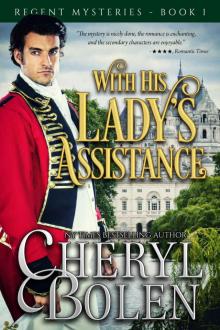 With His Lady's Assistance (The Regent Mysteries Book 1)
With His Lady's Assistance (The Regent Mysteries Book 1)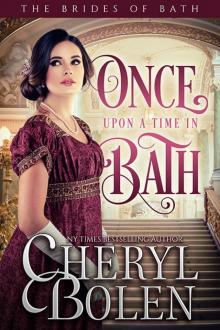 Once Upon a Time in Bath
Once Upon a Time in Bath One Room at the Inn (The Lords of Eton Book 4)
One Room at the Inn (The Lords of Eton Book 4)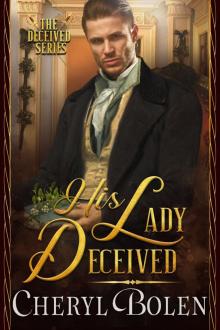 His Lady Deceived
His Lady Deceived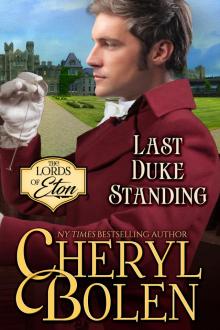 Last Duke Standing
Last Duke Standing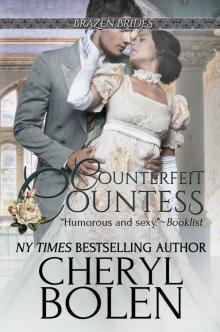 Counterfeit Countess: Brazen Brides, Book 1
Counterfeit Countess: Brazen Brides, Book 1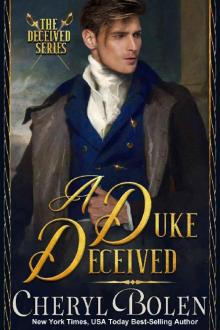 A Duke Deceived (The Deceived Series Book 1)
A Duke Deceived (The Deceived Series Book 1) An Egyptian Affair (The Regent Mysteries Book 4)
An Egyptian Affair (The Regent Mysteries Book 4) Winter Wishes: A Regency Christmas Anthology
Winter Wishes: A Regency Christmas Anthology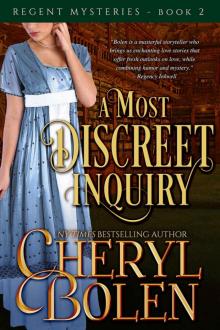 A Most Discreet Inquiry (The Regent Mysteries Book 2)
A Most Discreet Inquiry (The Regent Mysteries Book 2) The Portrait of Lady Wycliff
The Portrait of Lady Wycliff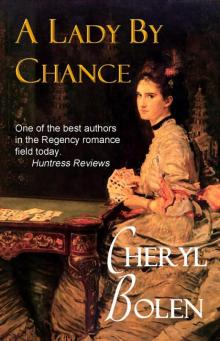 A Lady by Chance (Historical Regency Romance)
A Lady by Chance (Historical Regency Romance)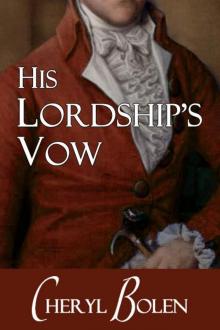 His Lordship's Vow (Regency Romance Short Novel)
His Lordship's Vow (Regency Romance Short Novel)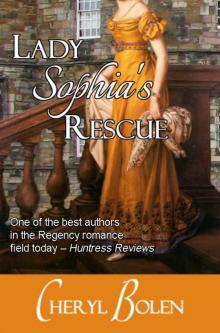 Lady Sophia's Rescue (Traditional Regency Romance)
Lady Sophia's Rescue (Traditional Regency Romance) A Birmingham Family Christmas
A Birmingham Family Christmas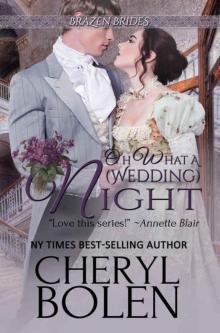 Oh What A (Wedding) Night (Brazen Brides #3)
Oh What A (Wedding) Night (Brazen Brides #3)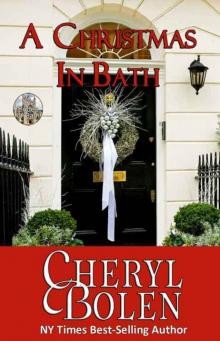 A Christmas In Bath
A Christmas In Bath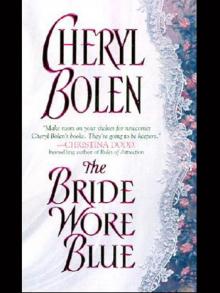 THE BRIDE WORE BLUE
THE BRIDE WORE BLUE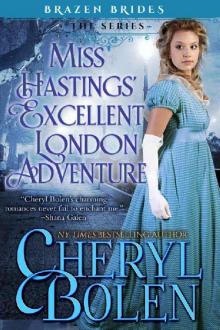 Miss Hastings' Excellent London Adventure (Brazen Brides Book 4)
Miss Hastings' Excellent London Adventure (Brazen Brides Book 4)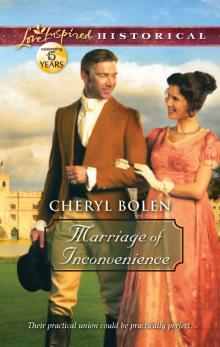 Marriage of Inconvenience
Marriage of Inconvenience Ex-Spinster by Christmas: House of Haverstock, Book 4
Ex-Spinster by Christmas: House of Haverstock, Book 4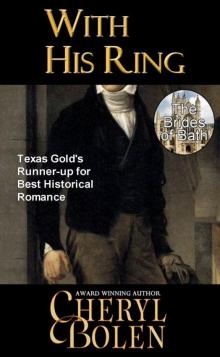 With His Ring (Brides of Bath Book 2)
With His Ring (Brides of Bath Book 2)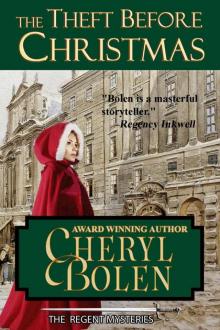 The Theft Before Christmas (The Regent Mysteries)
The Theft Before Christmas (The Regent Mysteries)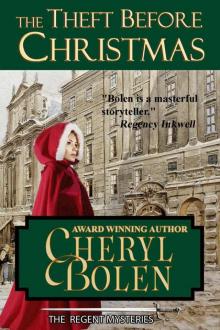 The Theft Before Christmas
The Theft Before Christmas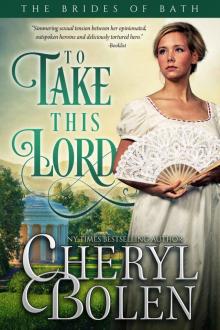 To Take This Lord (The Brides of Bath Book 4)
To Take This Lord (The Brides of Bath Book 4)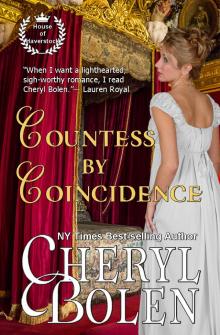 Countess by Coincidence
Countess by Coincidence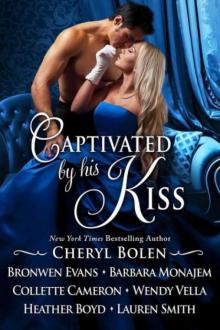 Captivated by His Kiss: A Limited Edition Boxed Set of Seven Regency Romances
Captivated by His Kiss: A Limited Edition Boxed Set of Seven Regency Romances A Birmingham Family Christmas (Brazen Brides Book 5)
A Birmingham Family Christmas (Brazen Brides Book 5)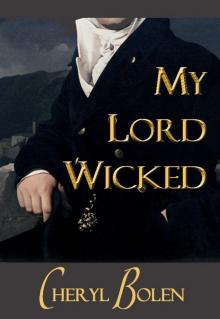 My Lord Wicked (Historical Regency Romance)
My Lord Wicked (Historical Regency Romance)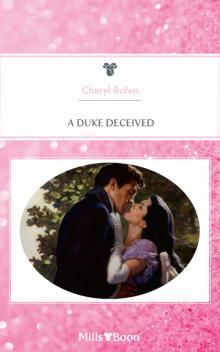 A Duke Deceived
A Duke Deceived The Earl, the Vow, and the Plain Jane
The Earl, the Vow, and the Plain Jane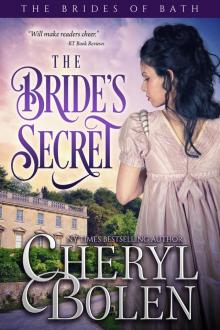 The Bride's Secret
The Bride's Secret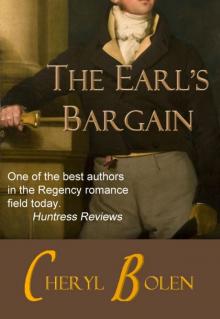 The Earl's Bargain (Historical Regency Romance)
The Earl's Bargain (Historical Regency Romance) Rebels, Rakes & Rogues
Rebels, Rakes & Rogues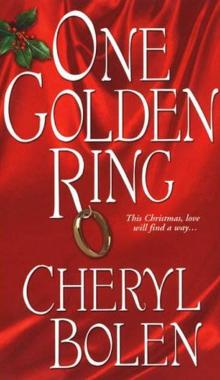 One Golden Ring
One Golden Ring